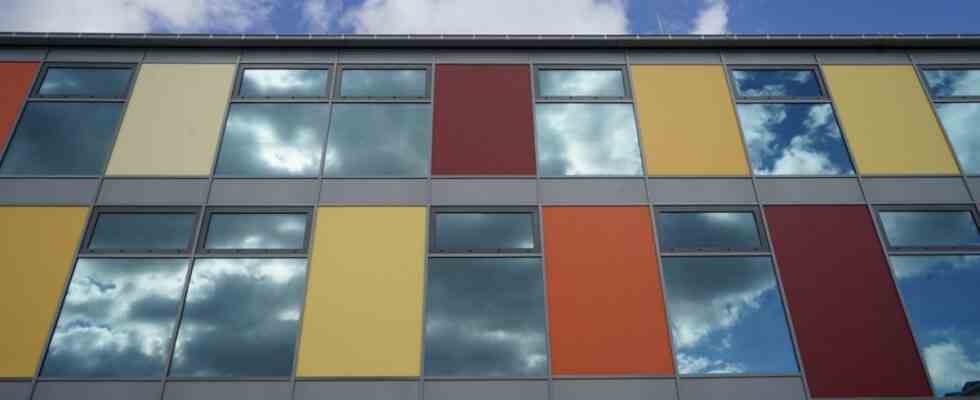The students at the Mathilde Eller School know how it works: save energy. For 15 years, children have been learning there how to regulate heating, how to save electricity in everyday life, how energy is generated, and above all: what the climate and they themselves benefit from all of this. Teacher Siegfried Grob heads the energy-saving foxes project, for which the school has received numerous awards, for example from the Federal President and the German Unesco Commission. When the school wanted a photovoltaic system on the roof ten years ago, it still had to fight for it. Today, this is standard for new school buildings in Munich.
“In the first four years of the project, we saved 480,000 kilowatt hours of heat just by regulating the heating,” reports Grob. “Nevertheless, no one froze.” He wrote the concept for the energy saving project himself; at the time there was none for special needs schools. Because that is also something special about the project: children and young people with intellectual disabilities study at the school. “Our students learn by doing, the theory comes afterwards,” says Grob. The children turned down the thermostats in the hallways, gymnasiums and toilets, closed the windows in the hallway in winter and checked the heaters weekly.
The Mathilde-Eller School is one of 130 schools and day-care centers in Munich that are taking part in the city’s “Fifty-Fifty” project. They get part of the energy costs they save back as a bonus. A total of 130 facilities – that sounds like a lot, but it really isn’t, after all there are around 360 public schools and 1,450 day-care centers in Munich.
The teacher Siegfried Grob heads the energy saving foxes project at the Mathilde Eller School.
(Photo: Robert Haas)
Saving energy is currently even more important than usual. In July Mayor Dieter Reiter commissioned the municipal departments to reduce consumption. The Department for Education and Sport (RBS) has launched an information campaign aimed at schools, day-care centers and clubs. On a Website projects, tips and hints can be found. For example, schools should ensure that rooms are not overheated. Where it is reasonable, the room temperature can also be lowered. “Even a room temperature increase of one degree Celsius leads to an additional consumption of heating energy of up to six percent.”
During the school holidays, the hot water supply was turned off at the city schools – if this did not affect the care services for children and young people, as a spokesman for the RBS reports. At the moment, however, there are “no plans to heat classrooms, day-care centers, school gymnasiums or sports rooms differently or to reduce the water temperature in school swimming pools”. As far as the use of the air filter devices in the classrooms is concerned, the RBS agrees with the latest recommendations of the Federal Environment Agency: In the current energy crisis, use in schools should be limited to what is absolutely necessary, use should remain limited to “hygienically necessary situations”. The classrooms should continue to be ventilated regularly.
The energy-saving foxes at the Mathilde-Eller-School deal with the topic for four hours a week, they measure temperature and light intensity, practice correct ventilation, dismantle fluorescent tubes over mirrors – and then present their results to the students in other classes. “Energy consumption is an important issue for everyone, because our students will later have little money available in everyday life,” says project manager Grob.
The school saves an average of 40 tons of CO₂ every year. And since the photovoltaic system on the school roof has been generating electricity, there are another six tons less CO₂. Hundreds of thousands of kilowatt hours of heat and electricity have already been saved – and so far more than 10,000 euros have been awarded through the “Fifty-Fifty” project. Whereby: Currently, the schools can only access the bonus from the previous year. The awards from previous years that have not yet been issued cannot be accessed at this time. The reason: the tense budget situation and general savings requirements, as a spokesman for the RBS reports. The topic is currently being clarified and schools will be approached again.
“The children shouldn’t have to sit in the classroom in winter coats.”
So while the city publishes energy saving tips, some parents worry that it could get uncomfortable in the schools and after-school care centers. “Schools are an important place of integration and education. We should make everyday school life as pleasant as possible for our children,” says Daniel Gromotka. He is chairman of the joint parents’ council of the city after-school centers and day care centers in Munich and warns against trying to save energy in schools and day-care centers at all costs. “Teachers shouldn’t have to start managing the shortage now. And the children shouldn’t have to sit in the classroom in winter coats.”
Of course, it is important to ensure that energy is not wasted and that the facilities meet the latest standards. Gromotka would also like an emergency plan for schools, daycare centers and after-school care centers in the event of power outages or gas shortages.
In the long term, the school building will make a contribution to saving energy and climate protection, according to the RBS, with photovoltaic systems and energy-efficient building envelopes. Renewable energies are used to supply heat, so the new buildings are on average almost 40 percent below the minimum legal requirements.
The pupils of the Mathilde Eller School have long noticed that saving energy pays off. For example, they use the money from the Fifty-Fifty project to finance the switch to organic food in the student café, they plant trees and buy a table football game if the student parliament decides to do so. And the energy-saving foxes and their teacher treat themselves to a visit to a restaurant – “something that the children couldn’t otherwise afford,” says Grob.

